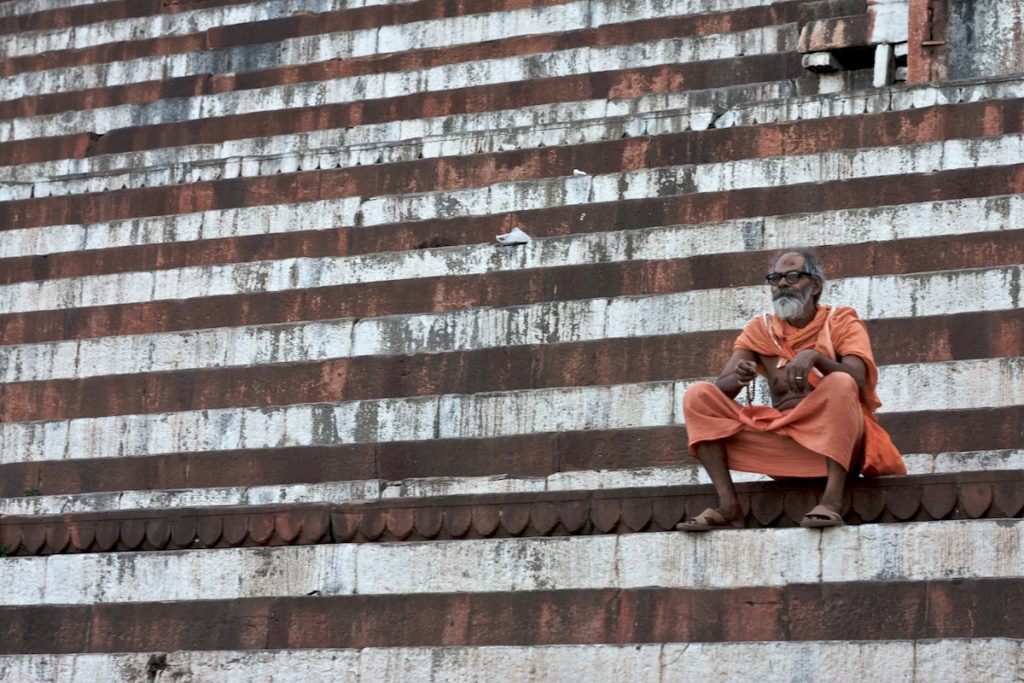Between tapas and haṭha
ascetic practices between history, ethnography and texts
with Laura Liberal, Silvia Patrizio and Daniela Bevilacqua
“Despite its current global popularity (or perhaps because of it), a clear understanding of the historical contexts of yoga in South Asia is often lacking, as well as the range of practices it encompasses. It's due, at least in part, limited access to textual material.
[…] As part of the recent transmission of yoga, the almost total hegemony of a small number of systems based on postural practice has strengthened a narrow and monochromatic vision of what yoga is and how it works, and this is even more evident if we compare this vision with the wide spectrum of practices presented in premodern texts. "
Mallinson, Singleton, The roots of Yoga [1]
How do we have you anticipated, finally here is the detailed program!
After a year of forced break, we get back on the road with Darśana's insights – Visions that from 2018 they accompany us during the social year as an opportunity for research, exchange and meeting. The path, started with the path of introduction to the philosophies of India and continued with a in-depth study of textual practice, will also be inaugurated this year, as per tradition, by Laura Liberale who will present us with a textual study on the figure of the renunciant ascetic according to the "classic" vision, starting with his latest book fresh off the press Waiver (Anima Mundi, 2021).
To follow ours once again Silvia Patrick that will guide us in a pre and post historical connection Patañjali, with an in-depth study on ascetic practices from the fifth century. a.C. to modernity.
It will then be the turn of Daniela Bevilacqua that will complete the three-dimensional vision with his contributions "from the field", putting texts and traditions in dialogue with the practices of contemporary ascetics: an unprecedented look to broaden the angle of view and question thatidea dell’India "Monocular" which is often the daughter of a mythical imagination frozen in time.
The question – of Allen inspiration – which is the background to this path that we have called “tra tapas and haṭhaIs indeed: what do we mean when we talk about tapas? It's still: what we talk about when we talk about haṭha yoga?
What do we mean when we talk about "yoga traditional"?
PATH
The itinerary is divided into “stages” according to three lines or dominant viewing angles: textual, historical and ethnographic.
A modular construction that allows maximum usability: each meeting is in fact self-contained but is at the same time connected with a thread to the previous and the next.
In this way, those who can only follow some meetings will have a partial but coherent vision with respect to the point of view of the meeting, while those who follow the entire path will have a three-dimensional and more in-depth restitution of the theme, even in its contradictions.
The course is open to all levels of knowledge: They are not required for admission requirements other than the curiosity and interest. The audio recordings and slides used will be made available.
MEETINGS CALENDAR
The. The renunciant ascetic with Laura Liberal
- Sunday 17 October, schedule 10-13
The meeting will focus on the definition of "tapas”And its connections to mythical themes (with due textual references) to then focus on the figure of the renunciant ascetic, using le Upaniṣad of the waiver, and so: the various traditional expressions of the ascetic path, the practice (with excursions in the texts on the dharma), the meaning of the renunciation.
II. Between tapas and haṭha: a historical connection Silvia Patrick
- Sunday 21 November, schedule 10-16
They will explore themselves, through Brahmanic testimonies, buddhiste e jaina, the first mentions of ascetic techniques (tapas) and meditative, anticipations of the development that it yoga will follow in its next story. Among these techniques, intended as possible answers to the problem of karma and rebirth, breath control is of particular importance (Pranayama).
Looking at the origins will allow you to go into the forms more consciously than the yoga techniques, in particular those defined as 'tantric', they will take on in medieval India until they are assimilated into haṭha yoga of the modern age. They will sift, like this, continuity and discontinuity of a path that, approximately from the 5th century. a.C., it will lead to the threshold of contemporaneity.
III. Tapas, haṭha and yoga among the Indian ascetics. A historical and ethnographic journey with Daniela Bevilacqua
- Saturday 4 December, schedule 10-16
This meeting has two main purposes: on the one hand, historically and ethnographically contextualize Hindu asceticism starting from the fourth century AD, and on the other hand, historically and ethnographically contextualize the practices of haṭha yoga, tapasyā and yoga among the ascetics.
In a first part, therefore, we will make an introduction to Tantric and devotional movements to understand the origin and the theoretical substrates on which some of the main sampradāya (religious orders) present in northern India, emphasizing the ascetic symbolism of the various orders and distinctive features. This theoretical substrate will also be fundamental for understanding the development of the practices ofhaṭha yoga from a textual and archaeological point of view, to then compare it with the idea of haṭha yoga present among contemporary ascetics. This will allow us to resume the theme of tapas presented in previous meetings and analyze the continuity between past and present. Lastly, we introduce the yoga sadhana of ascetics: we will develop the various external parts (giving an emphasis above all to asana, Pranayama and kriya) and we will then deal with the internal part up to samādhi, emphasizing the importance of topics such as mokṣa and karma.
speakers
Laura Liberal Writer, indolence to indulgence, He graduated in Philosophy (University of Turin) and PhD in Indological Studies (La Sapienza University of Rome). Writing teacher at the Master in Death Studies & the End of Life (University of Padua), holds training courses in the philosophical field and in that of Medical Humanities. He has won awards in several awards for poetry and fiction. His texts have appeared in magazines and anthologies. He published the novels Tanatoparty (Meridian, 2009), Madreferro (Pop Perdisa, 2012), The mourning (Meridian, 2014); the Sari poetry collections - poems for the daughter (d’If, 2009), Ball ground (d’If, 2011), The availability of our meat (Oedipus, 2017); Stratigraphic units (Ithaca archipelago, 2020), the indological sages The thousand names of Gaṅgā (Bear Editions, 2003), I Devīnāmastotra hindi - The purāṇic hymns of the names of the Goddess (Bear Editions, 2007), The names of Śiva (Cleup, 2018), Hellish visions of India (Padova University Press, 2021), Waiver (Anima Mundi, 2021). He is present among the authors of New Italian poets 6 (Einaudi, 2012). Collaborate with Aśvattha dal 2018 with "Saturday Morning Philosophical” e “darśana – Visions”Since the first edition.
Silvia Patrick, degree in Philosophical Sciences at the University of Pavia, he attended the Master “Yoga Studies: body and meditation in the traditions of Asia "at the Ca 'Foscari University of Venice, graduating with a thesis on the text Yogasūtra di Patañjali (Speakers Federico Squarcini, Gianni Pellegrini) who wins the YANI award for master's theses dedicated to yoga *. She graduated with honors from the Faculty of Science of Religions, Inter between Padua and Venice, with a thesis entitled “Words to make yourself. The practice of the text and the example of the Yoga Sutras " (Speakers Federico Squarcini, Gianni Pellegrini) who wins the YANI award for master's theses dedicated to yoga *. At the university was able to approach the study of Sanskrit, graduating to Summer School in Spoken Sanskrit with Sadananda Das teacher at the Universität Leipzig. Diploma as a yoga teacher at the four-year training course with Patrick Tomatis. Aśvattha partner collaborated with the project "darśana – Visions”Since the first edition.
* Both theses can be viewed and downloaded from YANI website
Daniela Bevilacqua, indianista, received the title of PhD in Civilization of Africa and Asia at the Sapienza University of Rome and in anthropology at the University of Paris Nanterre. He participated in theHatha Yoga Project, project financed by’ European Research Council (ERC). Currently it is Associate Researcher at SOAS (School of Oriental and African Studies), University of London.
SPACE
Aśvattha It is a small amateur sports association founded by Alberto Beggs in 2012 which has among its objectives the promotion, the diffusion, the knowledge and the practice of sport in general, with particular aims and interests for Yoga and more generally for gymnastics activities aimed at the health and fitness aimed at optimizing the psychophysical state, in particular in relation to the Eastern disciplines. In addition to regular courses in headquarters and other educational and informal settings, It promotes training and updating also a cultural nature.
Alberto Beggio and Manuela Piccardo trained with Walter Thirak Ruta della Pramiti School of Ventimiglia according to the teachings of Sri Sri Sri Satchidananda Yogi, continue to deepen the practice with training seminars both in Italy and in India, at Sri Vasavi Yogashram of Madras, run by Balaji Anbu Sivam, disciple of.
Ordinary YANI members seek to contribute to the spread of quality yoga by dedicating themselves passionately to the practice and continuing to seek and create opportunities for continuing education.
Why darsana?
It all starts with the search for a title for the path of introduction to the philosophies of India we had planned for 2018-19 and meeting with the cover photo, which is hanging in our house, a photo that Alberto made many years ago during a reportage in Varanasi.
We thought we could give back the idea of multiplicity, of opening: a man wrapped in a dhoti shelling a the edge sitting on the ghat a Varanasi, wearing sunglasses. We do not know exactly what she's looking, we can only imagine.
We like the idea that the word darśana [2], often it interpreted precisely with the term "philosophy", It would be translated as closely referring to the etymology of the word matrix (drs – see): would be more appropriate, therefore, to speak of "perspective", "Viewing angle", "perspective (on the existing)”, referring, then, more clearly to an "understanding" visual perspectives of the many wide open about the reality (only) [3].
What better way for the path we had in mind?!?
This cycle of meetings remains for us an opportunity for research and study to involve researchers and practitioners who question the known and known and lead us to leave our comfort zone to live in the inconvenience and complexity of that practice that is yoga.
PRACTICAL INFORMATION
The course is aimed exclusively at members and members of the Association.
It is possible to join by making a request and paying the annual fee of euro 20,00 including insurance that allows you to participate in all the activities of the center and in the lessons.
In compliance with the COVID-19 rules, the maximum number of participants is 10.
While preferring to participate in the presence, it will be possible to participate in live streaming having access to all the material shared by the speakers.
It will be necessary to maintain physical distance and wear a mask upon arrival and in the common areas. To access the space it is necessary to have a valid green pass. The temperature on arrival will be detected and the tracking rules will be respected.
For registration
Mail: using the form on the page Contacts
Phone: 349 6053395 Manuela Piccardo
The complete program


